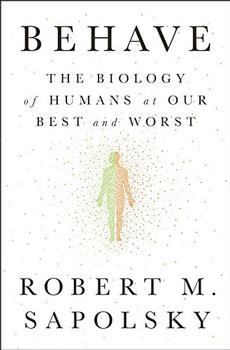
Critics' Opinion:
Readers' rating:
Published May 2017
800 pages
Genre: Science, Health and the Environment
Publication Information
Why do we do the things we do? More than a decade in the making, this game-changing book is Robert Sapolsky's genre-shattering attempt to answer that question as fully as perhaps only he could, looking at it from every angle.
Sapolsky's storytelling concept is delightful but it also has a powerful intrinsic logic: he starts by looking at the factors that bear on a person's reaction in the precise moment a behavior occurs, and then hops back in time from there, in stages, ultimately ending up at the deep history of our species and its evolutionary legacy.
And so the first category of explanation is the neurobiological one. A behavior occurs - whether an example of humans at our best, worst, or somewhere in between. What went on in a person's brain a second before the behavior happened? Then Sapolsky pulls out to a slightly larger field of vision, a little earlier in time: What sight, sound, or smell caused the nervous system to produce that behavior? And then, what hormones acted hours to days earlier to change how responsive that individual is to the stimuli that triggered the nervous system? By now he has increased our field of vision so that we are thinking about neurobiology and the sensory world of our environment and endocrinology in trying to explain what happened.
Sapolsky keeps going: How was that behavior influenced by structural changes in the nervous system over the preceding months, by that person's adolescence, childhood, fetal life, and then back to his or her genetic makeup? Finally, he expands the view to encompass factors larger than one individual. How did culture shape that individual's group, what ecological factors millennia old formed that culture? And on and on, back to evolutionary factors millions of years old.
The result is one of the most dazzling tours d'horizon of the science of human behavior ever attempted, a majestic synthesis that harvests cutting-edge research across a range of disciplines to provide a subtle and nuanced perspective on why we ultimately do the things we do...for good and for ill. Sapolsky builds on this understanding to wrestle with some of our deepest and thorniest questions relating to tribalism and xenophobia, hierarchy and competition, morality and free will, and war and peace. Wise, humane, often very funny, Behave is a towering achievement, powerfully humanizing, and downright heroic in its own right.
"Starred Review. Sapolsky's big ideas deserve a wide audience and will likely shape thinking for some time." - Publishers Weekly
"Starred Review. [Sapolsky] does an excellent job of bringing together the expansive literature of thousands of fascinating studies with clarity and humor… a tour-de-force." - Library Journal
"Starred Review. An exemplary work of popular science, challenging but accessible." - Kirkus
"Sapolsky finds not the high moral drama of the soul choosing good or evil but rather down-to-earth biology… a remarkably encyclopedic survey of the sciences illuminating human conduct." - Booklist
"Behave is like a great historical novel, with excellent prose and encyclopedic detail. It traces the most important story that can ever be told." - Edward O. Wilson
"This is a miraculous book, by far the best treatment of violence, aggression, and competition ever ... He even takes on "free will" with a clarity usually absent from the writings of philosophers on the subject. All this is done brilliantly with a light and funny touch that shows why Sapolsky is recognized as one of the greatest teachers in science today." - Paul R. Ehrlich
"Read Robert Sapolsky's marvelous book Behave and you'll never again be surprised by the range and depth of our own bad behavior." - Charles Duhigg, author of The Power of Habit and Smarter Faster Better
This information about Behave was first featured
in "The BookBrowse Review" - BookBrowse's membership magazine, and in our weekly "Publishing This Week" newsletter. Publication information is for the USA, and (unless stated otherwise) represents the first print edition. The reviews are necessarily limited to those that were available to us ahead of publication. If you are the publisher or author and feel that they do not properly reflect the range of media opinion now available, send us a message with the mainstream reviews that you would like to see added.
Any "Author Information" displayed below reflects the author's biography at the time this particular book was published.
Robert M. Sapolsky is the author of several works of nonfiction, including A Primate's Memoir, The Trouble with Testosterone, and Why Zebras Don't Get Ulcers. His most recent book, Behave, was a New York Times bestseller and named a best book of the year by The Washington Post and The Wall Street Journal. He is the John A. and Cynthia Fry Gunn Professor of biology, neurology and neurosurgery at Stanford University and the recipient of a MacArthur Foundation "Genius Grant." He and his wife live in San Francisco.





The Flower Sisters
by Michelle Collins Anderson
From the new Fannie Flagg of the Ozarks, a richly-woven story of family, forgiveness, and reinvention.

The House on Biscayne Bay
by Chanel Cleeton
As death stalks a gothic mansion in Miami, the lives of two women intertwine as the past and present collide.

The Funeral Cryer by Wenyan Lu
Debut novelist Wenyan Lu brings us this witty yet profound story about one woman's midlife reawakening in contemporary rural China.
Your guide toexceptional books
BookBrowse seeks out and recommends the best in contemporary fiction and nonfiction—books that not only engage and entertain but also deepen our understanding of ourselves and the world around us.